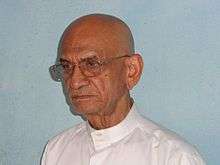Kapil Muni Tiwary
Kapil Muni Tiwary (born 1932) is a former professor and head of the department of Linguistics and Literature at Patna University[1] and currently a professor of English in Yemen.[2]
Kapil Muni Tiwary | |
|---|---|
 | |
| Born | 1932 Nainijor-Bishupur village, Bhojpur District, Bihar |
| Nationality | Indian |
| Alma mater | University of Pennsylvania |
| Occupation | Linguist |
Biography
Kapil Muni Tiwary was born in Nainijor village in the Bhojpur District of Bihar, India. He graduated from the University of Pennsylvania in 1966 with a dissertation on grammar and phonology, Comparative reconstruction of Indo-Iranian sounds: On the basis of 'An Avesta grammar in comparison with Sanskrit, part 1' by A. V. Williams Jackson.
Tiwary is a scholar of South Asian languages. He has published on such topics as echo words in Bhojpuri and has argued that echo-word constructions (in which "a word is repeated without its initial consonant, sometimes with a vowel change") can function as a kind of secret language.[3] He coined the term "institutionalized weeping" in a study of weeping among Tamil women.[4]
Books
Tiwary's first book, Panini's description of Sanskrit nominal compounds, was published by Janaki Prakashan, Patna in 1984. Another book, Language Deprivation and the socially disadvantaged: with special reference to Bihar, was published by Janaki Prakashan in 1994.[5] This book was an outcome of a project of Indian Council of Social Science Research on which he was working in the eighties.[6]
Editor
Tiwary was one of the editors of a bi-annual journal of social sciences and humanities, Explorations in 1987–88.[7][8] His article, Caste-Conflict: A View from Bhojpur, was published in Volume I, No. I of Exploration in 1987.[9]
He also edited an anthology of English prose, Aspects of English prose: an anthology, with R.C. Prasad in 1986.
Linguist
His articles and books on various branches of linguists have been of special interest for the scholars in India and abroad.[10][11][12][13]
References
- Tiwary, K. M. (Autumn 1978). "Tuneful Weeping: A Mode of Communication". Frontiers: A Journal of Women Studies. 3 (3): 24–27. doi:10.2307/3346324. JSTOR 3346324.
- Sherzer, Joel (1987). "A Discourse-Centered Approach to Language and Culture". American Anthropologist. 89 (2): 295–309. doi:10.1525/aa.1987.89.2.02a00010. JSTOR 677756.
- Clark-Decès, Isabelle (2005). No one cries for the dead: Tamil dirges, rowdy songs, and graveyard petitions. University of California Press. p. 4. ISBN 9780520938342.
- , openlibrary.org. Retrieved 12 March 2011
- "Language deprivation among the socially disadvantaged in Bihar". Indian Council of Social Science Research, New Delhi. 1989.
- , www.books.google.co.in. Retrieved 27 March 2011
- Cambridge University Press (1988). "Brief Notices". Language in Society. 17 (3): 459–473. doi:10.1017/s0047404500013038.
- "Caste Conflict: A View from Bhojpur". Explorations. Radha Devi Mahila Vidyapeeth, Sikandarpur, Muzaffarpur. 1 (1). 1987.
- Debra J. Occhi, Society for Linguistic Anthropology (U.S.) (1 January 1999). Languages of sentiment: cultural constructions of emotional substrates. John Benjamins Publishing Co, The Netherlands. p. 47. ISBN 9789027251381.
- James MacLynn Wilce (2009). Crying shame: metaculture, modernity, and the exaggerated death of lament. Blackwell Publishing. p. 249. ISBN 9781444306255.
- Herman Parret, ed. (1975). History of linguistic thought and contemporary linguistics. p. 142.
- Regna Darnell, ed. (2002). American anthropology, 1971–1995: papers from the American anthropologist. American Anthropological Association, USA. p. 514. ISBN 0803266359.
External links
- Kapil Muni Tiwary at Open Library
- Journal of Communication Practices – Previous Issues
- Tiwary, K.M. (1978). "Tuneful Weeping: A Mode of Communication" Frontiers: A Journal of Women Studies.